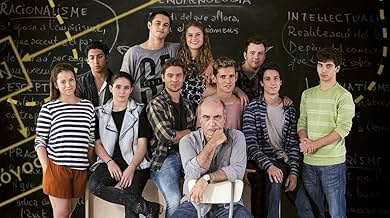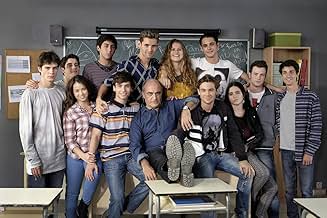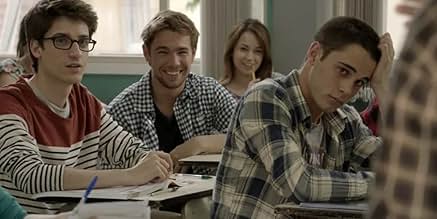Une série télévisée sur Merlí, un professeur de philosophie au lycée, qui enseigne de façon originale, et sur les élèves de sa classe, dont son propre fils, et sur la relation, l'amitié, l'a... Tout lireUne série télévisée sur Merlí, un professeur de philosophie au lycée, qui enseigne de façon originale, et sur les élèves de sa classe, dont son propre fils, et sur la relation, l'amitié, l'amour et les problèmes entre les élèves.Une série télévisée sur Merlí, un professeur de philosophie au lycée, qui enseigne de façon originale, et sur les élèves de sa classe, dont son propre fils, et sur la relation, l'amitié, l'amour et les problèmes entre les élèves.
- Prix
- 1 victoire et 2 nominations au total
Parcourir les épisodes
Avis en vedette
Having lived in Catalonia for some time many years ago I was automatically drawn to Merlí.
To say that I was pleased, or that it is well-done, would be gross understatements! Truly... "Merlí" is indeed a dazzling gem! Anything lacking due to financial constraints is made-up for fifty times over in so many ways – particularly in the compelling performances of the actors, one can't help but feel what they are portraying!
The show deals with quite a broad spectrum of unique and sensitive topics- a number of which are often considered taboo in certain areas- but I really enjoy the thoughtful and creative way in which they are handled and beautifully woven into the story and philosophical discourse themes in such a natural, believable & organic way.
I especially enjoy the many on-location shoots and cinematic views featuring Barcelona and the local area which are very beautiful and picturesque.
Aside from the normal frustration about the poor decisions of the characters now and then; the reservation I do have about "Merlí" is the prolific use of profanity throughout the dialogue. While it doesn't bother me, I can imagine that especially for a native Spanish speakers it could detract from one's enjoyment- because such words always have so much more emotional gravity for native speakers.
Language barrier is certainly somewhat of an issue for me- my Spanish is limited (and much more focused on American dialects/pronunciations) and I only have some peripheral familiarity of Catalan vocabulary lingering from my time there. My proficiency in Italian has proved rather helpful before I managed to locate English subtitles. The acting is so fantastic that the most important emotions & concepts are clearly understood. I finally collected English subtitles for all of the episodes now- although they seem to vary significantly in tone, accuracy, quality and style, etc. But they beat nothing all of the place! And I'm anxious to re-watch what I've seen and finish watching the currently available episodes with the translated dialogue.
Virtually all of the original dialogue spoken during filming is Catalan; which is not just a regional, colloquial dialect of Spanish. It is a bonafide, unique language with an instantly recognizably different phonology, and very distinct vocabulary & literature going as far back as Castilian Spanish. In fact Catalan was the official (commercial/governmental) and common spoken language for most of what is now Spain for many centuries; and linguistically it has more in common with Franco-Italo romance languages than it does with Spanish or Portuguese. Currently its use is mostly limited to Catalonia & Valencia where it holds equal legal status as Spanish and nearly everyone is bilingual. This explains how such a seamless Spanish language audio track was also recorded by all the original actors. I watched the first season in Spanish, but have only been able to find the original Catalan version of second season.
To say that I was pleased, or that it is well-done, would be gross understatements! Truly... "Merlí" is indeed a dazzling gem! Anything lacking due to financial constraints is made-up for fifty times over in so many ways – particularly in the compelling performances of the actors, one can't help but feel what they are portraying!
The show deals with quite a broad spectrum of unique and sensitive topics- a number of which are often considered taboo in certain areas- but I really enjoy the thoughtful and creative way in which they are handled and beautifully woven into the story and philosophical discourse themes in such a natural, believable & organic way.
I especially enjoy the many on-location shoots and cinematic views featuring Barcelona and the local area which are very beautiful and picturesque.
Aside from the normal frustration about the poor decisions of the characters now and then; the reservation I do have about "Merlí" is the prolific use of profanity throughout the dialogue. While it doesn't bother me, I can imagine that especially for a native Spanish speakers it could detract from one's enjoyment- because such words always have so much more emotional gravity for native speakers.
Language barrier is certainly somewhat of an issue for me- my Spanish is limited (and much more focused on American dialects/pronunciations) and I only have some peripheral familiarity of Catalan vocabulary lingering from my time there. My proficiency in Italian has proved rather helpful before I managed to locate English subtitles. The acting is so fantastic that the most important emotions & concepts are clearly understood. I finally collected English subtitles for all of the episodes now- although they seem to vary significantly in tone, accuracy, quality and style, etc. But they beat nothing all of the place! And I'm anxious to re-watch what I've seen and finish watching the currently available episodes with the translated dialogue.
Virtually all of the original dialogue spoken during filming is Catalan; which is not just a regional, colloquial dialect of Spanish. It is a bonafide, unique language with an instantly recognizably different phonology, and very distinct vocabulary & literature going as far back as Castilian Spanish. In fact Catalan was the official (commercial/governmental) and common spoken language for most of what is now Spain for many centuries; and linguistically it has more in common with Franco-Italo romance languages than it does with Spanish or Portuguese. Currently its use is mostly limited to Catalonia & Valencia where it holds equal legal status as Spanish and nearly everyone is bilingual. This explains how such a seamless Spanish language audio track was also recorded by all the original actors. I watched the first season in Spanish, but have only been able to find the original Catalan version of second season.
There is definitely a before and after watching Merlí in my life, or plenty of reasons.
First of all, everything on it -but Merlí itself- It's completely down to earth and very easy to identify with, both characters and plot. There is no quest, no good and eveil, no heroes and villians. Merl'i is about ordinary people struggling with problems of ordinary life (and not for that easy). Characters are deeply developed, with complete absense of stereotypes, and yet, we all know a Pol, a Berta, a Tania, a Bruno. We also know someone dealing with financial problems, or whose parents are getting divorced, or that feels very unsure of their sexuality: Again, all people and problems that hit us just in our heart, because this sh¡t happens to us and in the end, it's what life is about.
Merlí himself is the only extraordinary aspect of this show. An unorthodox, rebelious teacher that gets his pupils to really do philosophy. Not just learning names and concepts by hard, but actually thinking, questioning and approaching their daily life from different angles. He is in some way similar to Mr. Keating from the Dead Poets Society (actually the whole show is a bit like the movie). Plus, he has many flaws, what makes him an ordinary man, although he is one of a kind. Each episode has te name of a different philosopher or school and explains basic concepts to us mortals who never read any of that before. It hooked me, and now i'm interested of learning more of it.
I felt over and over reflected in characters, relationships and situations in a way that touched me deep inside, as very few books or movies did before. Everything in this show seemed very real, very close to me and very dear. It made me feel i was a teenager again and I started re-thinking many questions we usually ignore. What am I doing with my life? Am i happy with myself? Should i settle with my reality? And on and on. I really wish i could time travel and show this series to my 17 year old me. I would have bolder and crazier decisions, but i would have been happy too. As Thoreau said "and not, when i came to die, discover that i had not lived"
For such a gem to exists, one expects this quality from the powers of Hollywood or European origins. But for this to come out of a region in the corner of Europe and from dialectical language, not per se a primary color like English, French or Italian is truly fantastic. Its a beautiful language. I found myself glued to the screen. As a well read and also written author in an architectural genre, I am unfortunately not bi lingual, like many Americans. Catalonian culture brings for me the richness of Antonio Gaudi and art nouveau, but a great connection to the arts. The episodes in this series are named after famous philosophers from history but the plots and character development are well thought out. There-in lives a synonymity of philosophizing, the explanations of each icon like Plato and Aristotle, flowing together. Their theories of life meld with complex character development in a low budget production that doesn't feel that way at all or isn't made obvious. Each character seems to be as developed as the TOS Star Trek characters of Roddenberry. The symbolism of the Owl that appears in each episode speaks words of wisdom at the right time in the flow of the themes imagery and music. But the messages about acceptance and the balance of a carefree liberal approach to life compared to the staunch conservative values and boundaries illuminates the important things in life, our own universal loneliness and how each individual is important to the other. It shows us our strengths and weaknesses and how to recognize each. This is very well done. As an architect, photographer painter and author, I think this series promotes art as holistic and a necessary presence to balance the technical qualities of our everyday life. Form follows function and this show dares to mix the sacred with the profane with much tact and subtle nuance. Bravo Peter Lagomarsino, Satellite Beach FL USA
Nothing, and I mean nothing, has ever messed me up like this brilliant show did, and the best thing about that is that among all the sad moments, there were a lot of really powerful happy moments that brought forth just as much if not more tears. I can't even begin to describe how important this show is, and I'm not sure if it's even possible to put it properly in words. Throughout the show, we see the evolution of each character, Merlí included, partly thanks to Merlí's amazing advice and their own initiative. The suffering and success faced by these characters is all explainable in some way or form, so When his teachings of philosophy go beyond the classroom and the characters apply these ideas to their own lives and relationships, the beauty of having a teacher who actually cares about connecting with their students in a non-superficial way really hit me. Each character that came and went left their mark, but their loss never felt out of place or useless. This show had me feeling nostalgic for characters and memories I've only been aware of for a few days, had me loving each and every one of the characters because an actual effort was made by the writers and actors to make them understandable, and had me sobbing at how absurdly perfect some moments were. This was beautifully written, beautifully filmed, beautifully acted, and powerful in its subtlety. Watch. This. Show. Watch it, fall in love with it, gain an interest in philosophy, pay attention, and allow yourself to really *think*. 10/10!
I'd bet that if a commensurate TV series like Merli (Merlin) was in a more familiar European language or an American TV series, it would be a huge hit. It is in Catalan, a language spoken by about 10,000,000 people, most in Barcelona and its surrounding area. The concept is ingenious, but there are lots of ingenious concepts. What makes this a great show is that the realization of the concept is wonderful. Don't take my word for it. The series has already been optioned in the U.S., France, and other countries. A non-conforming high school philosophy teacher (philosophy in high school?) brings classroom learning to life, but also becomes a central agent of change in the lives of his students, their parents, and the other teachers. Life changing is not always positive. Merli is not a do-gooder. He is clever, deceptive, even desperate at times, but he knows who he is, and knows how the world works. The entire cast is terrific. The scripts are so smoothly written that the actors seems to just ease into the action. There is rarely a wrong note in the series. It's nothing like American TV shows about high school students that portray them as brats or goof balls or stereotypes. It's available with English subtitles. If you know a Romance language, you will probably catch some of the dialogue. Catalan seems a mix of Spanish, French and Italian. I am waiting for season two to be available. I binge watched the first season in four days.
Le saviez-vous
- AnecdotesDuring the first season (2015), a promotional YouTube channel was created with Gerard Piguillem's name, where actors Marcos Franz and Adrian Grösser (as their characters) made a blog about the day-to-day in the new school year with Merli.
- Autres versionsIn the Spanish (Castilian) dubbing most of the actors dubbed themselves, only were dubbed by different voice actors: Pere Ponce, Candela Antón (with 2 different voices), Albert Baró, Elisabet Casanovas, Adrian Grösser, Patrícia Bargalló, Sandra Monclús, Boris Ruiz (although his character didn't speak Catalan), Mar del Hoyo, Rubén de Eguia, Pep Jové, Pau Vinyals, and Isaac Alcayde.
- ConnexionsReferenced in Merlinari (2017)
- Bandes originalesVol del borinot
Written by Nikolai Rimsky-Korsakov
Meilleurs choix
Connectez-vous pour évaluer et surveiller les recommandations personnalisées
Détails
- Date de sortie
- Pays d’origine
- Site officiel
- Langues
- Aussi connu sous le nom de
- Merlín
- Lieux de tournage
- sociétés de production
- Consultez plus de crédits d'entreprise sur IMDbPro
Contribuer à cette page
Suggérer une modification ou ajouter du contenu manquant

![Regarder Promo Temporada 3 [VO]](https://m.media-amazon.com/images/M/MV5BNDQyOWU1NzQtNGFhMi00ZmE0LWEyYTYtMzJmZWU4Y2M4Y2RiXkEyXkFqcGdeQXRodW1ibmFpbC1pbml0aWFsaXplcg@@._V1_QL75_UX500_CR0)



















